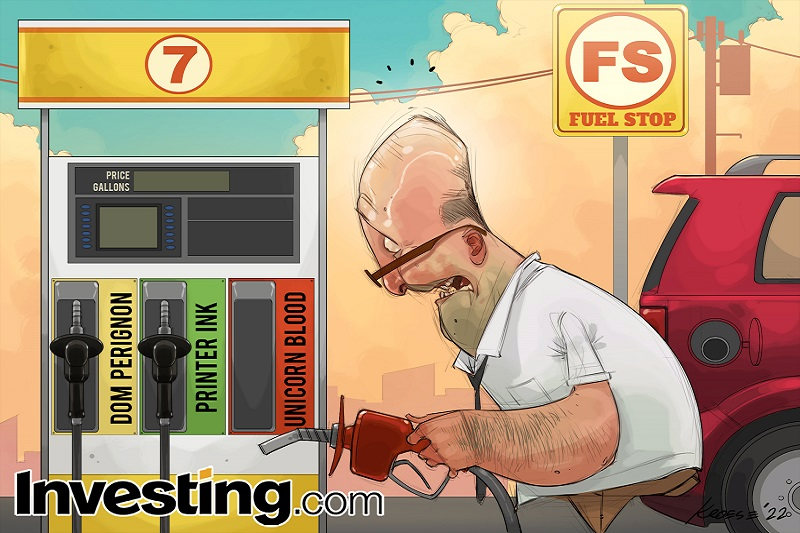By Geoffrey Smith
Investing.com -- What happens when an economic necessity becomes a luxury?
Europe is at its wits’ end trying to square the circle: to put pressure on Vladimir Putin to stop his assault on Ukraine, it needs to stop sending money in return for oil and gas imports. But if the oil and gas imports stop, then the European economy will collapse.
Governments all across Europe are scrambling to find ways to ease the pain for consumers who are facing record costs for motoring, and with good reason. High fuel prices can quickly bring social instability, as refinery blockades in the U.K. and the ‘Yellow Vests’ movement in France have proved within the last few years. Given the extreme emergency facing Europe right now, it cannot afford such distractions.
Last week, gasoline prices in Europe ranged from as little as 1.46 a liter in Poland to 2.26 a liter in Germany. That’s equivalent to a range of $7.36 to $11.38 a gallon. Any U.S. drivers feeling miffed at record high gas of $4.25 a gallon might want to bear in mind that, during the early stages of the pandemic when crude prices briefly fell below zero, German gas prices bottomed at $5.90 a gallon.
There’s a one-word explanation for the difference: tax. Taxes can account for anything up to 75% of what a European driver pays to fill up the tank, the result of years of policy-making that has tried to incentivize fuel efficiency and the use of public transport. That means that there is plenty of scope for government action to make a difference.
A raft of cuts in fuel duty are consequently coming down the line. France has said it will cut 15 euro cents a liter off duty on gasoline for the next four months. On Wednesday, U.K. Chancellor of the Exchequer Rishi Sunak is widely expected to announce a similarly time-bound 5 pence per liter cut in duty, while Italy’s Prime Minister, the former European Central Bank President Mario Draghi, intends to cut fuel duty by 25 cents a liter for one month.
The French and Italian cuts alone are bigger than the entire gasoline tax usually levied by the likes of Maryland and Georgia, two states which have suspended collecting the tax while prices are so high. It’s the same situation in other states such as New York and Illinois, which are also considering similar measures.
In Germany, Finance Minister Christian Lindner has proposed a rebate system which would see the government reimburse retailers for cutting pump prices. His coalition partners – the left-wing Social Democrats and Greens, who tend to drive fewer gas-guzzling SUVs – don’t like the idea, but have yet to come up with anything better.
Temporary tax cuts can make sense: fuel prices tend not to stay so painfully high because people cut back on consumption, causing prices to fall again. But these are also political timetables. The French cut will expire conveniently after the presidential election vote in April, while Sunak’s measures are made all the more necessary by the fact that other household energy tariffs as well as some income-related taxes are set to go up in April. Something has to give.
More worryingly, the risk – as ever – is that measures originally intended as temporary become permanent due to the difficulty of reversing them. Right now, with every day that passes, the notion that the war in Ukraine can be brought to a quick end, and that sanctions on key oil exporter Russia can be lifted, looks more and more fanciful.
Indeed, if anything, the reverse is happening: EU leaders are set to discuss tightening their sanctions on Russia at a meeting in Brussels on Thursday, with an increasing number wanting an outright ban on purchases of Russian oil, which ensures a steady flow of hard currency to the Kremlin (U.S. President Joe Biden will also be in town to stiffen their resolve, in the teeth of ongoing opposition from Germany and Hungary).
Russia’s Deputy Prime Minister and Energy Minister Alexander Novak tried to pre-empt such a move on Monday, saying it could drive crude prices as high as $300 a barrel. History, however, suggests that importers will run out of money to buy it long before then, triggering a sharp global slowdown and an equally sharp reversal in prices.
Bank of America’s commodities research head Francisco Blanch told Bloomberg on Monday that he sees prices peaking at only half that level but concedes that the war has added $25-$30 to all his forecast scenarios.
The pain is real. The only questions are – does the West think it is worth it, and how long can it take it?
